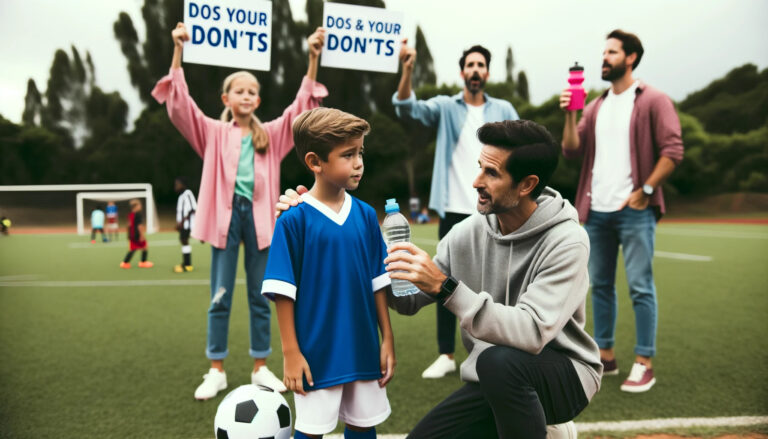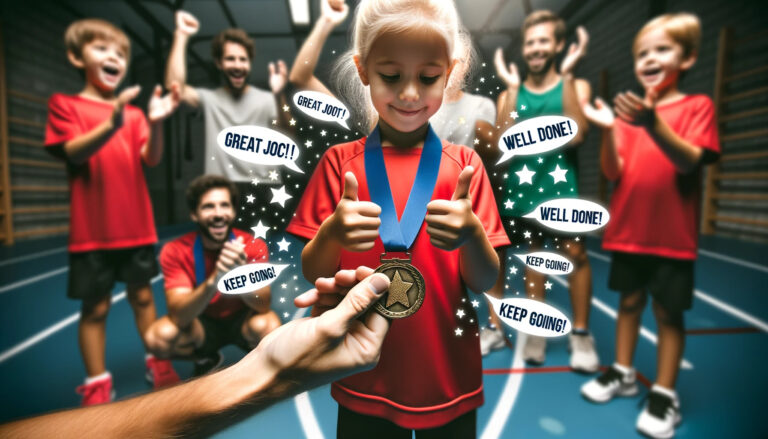Visualization Techniques for Boosting Performance in Young Athletes
- The Importance of Rest and Recovery in Young Athletes’ Regimens - October 23, 2023
- Boosting Stamina and Endurance in Young Athletes: Tips and Tricks - October 23, 2023
- The Role of Coaches in Shaping Young Athletes - October 23, 2023
Understanding the Concept of Mental Imagery in Sports
Mental imagery, often referred to as visualization, is a cognitive process where the individual employs all senses to create a mental image of an action or scenario. This process is widely utilized in the realm of sports. Athletes and trainers harness the power of mental imagery to recreate complex sport-specific skills, plan strategies and ready themselves for competitive environments, all entirely within the confines of the mind.
In the sports industry, mental imagery serves a dual purpose – development of technical skills and psychological conditioning. For the technical aspect, athletes mentally rehearse their moves, physically invisible, but their brains lighting up as if the action were being performed. On the psychological front, mental imagery aids in enhancing focus, reducing anxiety, and building confidence. Combining these two key components enhances an athlete’s overall performance on the field.
The Link Between Mental Preparation and Athletic Success
Mental preparation plays a pivotal role in the realm of athletic success. It’s a significant factor that often distinguishes an average athlete from an extraordinary one. This is because the human mind is a powerful tool, and mastering mental skills can boost performance levels, increase concentration, and foster resilience. Notably, this mental strength allows athletes to respond efficiently and effectively to high-pressure situations commonly encountered in the sporting environment.
Numerous studies have underscored the correlation between mental preparation and improved athletic outcomes. For instance, a routine embracing mental training techniques like visualization, positive affirmation, and mindfulness may assist athletes to enhance their skills, bolster their confidence, and meticulously plan their strategies. These cognitive strategies bridge the gap between physical potential and actual performance, thereby enabling athletes to maximize their capabilities and edge out competition.
Nurturing Young Minds: Enhancing Sports Performance Through Mindfulness
In the field of sports, mental preparedness is as crucial as physical readiness. When it comes to nurturing young sportspersons, introducing the concept of mindfulness can prove essential. It is a multifaceted mental capability that entails active attention to the present, being aware of one’s thoughts, emotions, body sensations and the environment without judgement. By mastering mindfulness, budding athletes can learn to control their reactions better, enabling them to respond effectively in high-pressure competitive situations.
Besides enhancing the mental strength of young athletes, mindfulness also significantly improves their performance. Mindful athletes are better able to focus on present tasks, shut out external distractions and manage stress effectively. This helps in better execution of skills, improved decision making and increased resilience. Moreover, mindfulness techniques inspire a higher level of self-confidence and calm during competition, which can lead to improved overall performance. By integrating mindfulness into their training regimen, young athletes can enrich their skills and ensure holistic development of their sporting talents.
Practical Guide to Implementing Mental Rehearsal in Training
For athletes, mental rehearsal can be as critical to their training sessions as physical exertion. It involves simulating the sporting event in their minds, working through every detail from start to finish, harnessing the power of visualization to create a successful outcome. This technique allows the brain to prepare and adapt, building a mental blueprint for actual performance and often contributing to improved results. From casual runners to competitive swimmers, athletes of all levels can harness the power of mental rehearsal for better outcomes.
Integration of mental rehearsal into training can be gradual and methodical. It starts with beginning each training session with a few minutes of visualization. Athletes are taught to imagine the course of action they will take, the potential obstacles they might encounter, and the strategies they will use to overcome these. Over time, as athletes get more comfortable with this process, the duration and intensity of the mental rehearsals can be increased. Importantly, the mental rehearsal must be tailored to the individual athlete’s needs and the demands of the particular sport they are involved in.
Skill Enhancement through Imagery: A Step-by-Step Process
To understand the process of skill enhancement through imagery, one must first grasp the underlying concept. Mental imagery, often referred to as visualisation, is a powerful technique used by athletes worldwide to enhance their performance. This technique involves vividly picturing specific sequences of their sport or activity in their mind.
The best part is, incorporating mental imagery into athletic training can be accomplished in a few straightforward steps. It begins with relaxation training to help the athlete center their mind and body. Following this, the athlete concentrates on constructing detailed visual and sensory images of their performance. They should also incorporate external factors such as the environment and crowd noise, to make the image as realistic as possible. It’s important for the athlete to focus on not just the visual, but also the kinesthetic sensation – how the movement feels. This amalgamation of multi-sensory imaging sharpens the athlete’s motor skills without them even physically performing the action.
Leveraging Mind-Body Connection for Improved Athletic Outcomes
The connection between the mind and body is a crucial aspect when it comes to enhancing athletic performance. This intimate connection can be leveraged to elicit superior results on the field or arena. A major component of the mind-body matrix in sports is the ability to control one’s responses to stress and anxiety. For instance, athletes who adopt mental techniques like visualization exercises have been found to successfully manage game-related stressors and keep body impulse responses in check. This mindful management of physiological responses has been linked with improved game performance, increased endurance, and quick decision-making ability.
Mental training plays a key role in tapping into the power of the mind-body connection. Techniques such as breathing exercises and meditation can help athletes achieve a state of mindfulness and focus, which can be crucial during a competition. Additionally, a regular practice of mental exercises can increase an athlete’s awareness of their body, which in turn aids in the refinement of their skills. This heightened awareness gained through mental training can help an athlete not only understand their physical capabilities better but also identify areas of weakness and strive for improvement. The mind-body connectivity thus leveraged can pave way for enhanced athletic outcomes.
Case Studies: Proven Success of Mental Training in Youth Sports
The historical resurgence of interest in mental training for young athletes is echoed in its success stories, perhaps more than anything else. A variety of case studies that demonstrate the overall effectiveness of these training practices, particularly in youth sports, vividly illustrate this point. For instance, an English youth football academy found that players who engaged in regular mental training sessions displayed marked improvement in their on-field performance, as well as their ability to cope with challenging situations on and off the pitch.
Similarly, a renowned junior tennis program in the United States also successfully incorporated mental training into its regular practice regimen. The program provides evidence-based mental skills training, self-assessment tools, and personalized coaching to help young athletes develop resilience, self-confidence, and concentration. The results were astounding—the participating athletes significantly improved their game, displaying enhanced focus during matches and resilience in the face of adversity. These case studies, among many others, affirm the effectiveness of mental training in youth sports.
Challenges and Solutions in Implementing Mental Training Programs
One of the main challenges in implementing mental training programs in sports revolves around misconceptions and stigma. Often, athletes, coaches, and parents undervalue the role of mental conditioning in sports, focusing primarily on physical strength and agility. This mindset can create obstacles to the initial implementation and acceptance of such programs. Previous generations may view mental training as admission to weakness, anxiety, or failure instead of recognizing it as an essential component to enhancing athletic performance.
To address these challenges, the first step begins with emphasizing education, to communicate the benefits and potential impact of mental training to athletes, coaches, and parents. For athletes, it would be useful to show how mental skills can improve their concentration, composure, confidence, and consistency. Coaches need training and certification to develop their understanding and ability to integrate mental training into regular physical workouts. In the case of parents, testimonials and statistics can be used to illustrate how athletes at all levels use mental training to their advantage. An additional solution is to individualize mental training programs, catering to the specific needs and capabilities of each athlete, which can lead to better acceptance and efficacy.
Continued Progress: Monitoring and Adapting Mental Training Strategies
As athletes progress through their training, it is essential to keep track of their mental and physical development. Regular monitoring of an individual’s cognitive performance can yield valuable insight into their mental growth. This data can be obtained through various means such as performance evaluation, emotional assessment, as well as through moving mindfulness scales. Understanding how an athlete is responding to training – their resilience, focus, emotional control, and visualization- can aid in guiding the training process more efficiently.
Adaptability is crucial when implementing mental training strategies. The nature of sports psychology is highly individualized and necessitates flexibility. As new trends and research emerge, strategies should be updated and modified to optimize the mental training programs. Furthermore, as athletes advance, their mental requirements alter. A particular approach that was effective during their early stages may not be as efficient later. Thus, continually adjusting these strategies is inevitable to ensure athletes receive the instruction that best suits their current developmental stage and skill level.
Exploring Future Trends in Mental Training for Young Athletes
Technological advancement is shaping the future of mental training in youth sports. Emerging technology like virtual reality (VR) and augmented reality (AR) are expected to take mental imagery to new heights. VR, in particular, can create realistic simulations of various sports situations, providing athletes with immersive experiences that enhance visualization skills. These experiences aim to help athletes improve their performance by mentally rehearsing and mastering techniques in a wide range of scenarios.
In the sphere of sports psychology, an increase in holistic mental training approaches is anticipated. As talent identification programs continually recognize the importance of mental skills at an early stage, practitioners are likely to focus more on sharpening young athletes’ mental resilience, focus, and decision-making capabilities. These transformative trends represent a greater understanding of the mind-body linkage in sports and an acknowledgment of mental wellbeing as an essential component of an athlete’s overall growth and performance.
What is mental imagery in sports?
Mental imagery in sports refers to the practice of athletes mentally rehearsing their performance. It involves visualizing specific sporting situations, activities, actions, and outcomes to prepare the mind for actual performance.
How can mental preparation contribute to athletic success?
Mental preparation can contribute to athletic success by reducing anxiety, increasing concentration, boosting confidence, and enhancing motivation. It can help athletes to better anticipate the challenges they might face during their sports performance and devise effective strategies to overcome them.
What is meant by enhancing sports performance through mindfulness?
Enhancing sports performance through mindfulness involves training athletes to maintain a state of active, open attention on the present. It helps athletes to accept their feelings, thoughts, bodily sensations, and surrounding environment without judgment, thus helping them to remain calm, focused, and resilient under pressure.
How is mental rehearsal implemented in training?
Mental rehearsal is implemented in training by instructing athletes to visualize themselves performing their sport-specific skills successfully. It usually involves breaking down the skill into manageable sections, visualizing each section vividly, and then progressively integrating these sections into a complete performance.
What is the link between imagery and skill enhancement in athletics?
The link between imagery and skill enhancement in athletics is that mental imagery can help athletes to develop, refine, and strengthen their sports skills. It can facilitate motor learning, improve movement coordination, enhance decision-making, and foster self-efficacy.
What are some successful case studies of mental training in youth sports?
There are many successful case studies of mental training in youth sports. For instance, some young athletes have reported improved competitive performance, increased self-belief, enhanced concentration, reduced performance anxiety, and higher satisfaction with their sports participation after participating in mental training programs.
What are some challenges in implementing mental training programs?
Some challenges in implementing mental training programs include lack of time, resources, and trained personnel; resistance from athletes, parents, or coaches; difficulty in measuring mental skills; and potential overreliance on mental training at the expense of physical training.
How can these challenges be addressed?
These challenges can be addressed by integrating mental training into existing coaching and training routines, providing adequate resources and professional development opportunities for coaches, educating athletes and their support systems about the benefits of mental training, using valid and reliable assessment tools, and maintaining a balanced approach to athletic development.
How should progress in mental training be monitored and adapted?
Progress in mental training should be monitored and adapted through regular assessment, feedback, and adjustment based on athletes’ evolving needs, responses, and performances. This process allows for the fine-tuning of mental training strategies to maximize their effectiveness and relevance.
What are some future trends in mental training for young athletes?
Future trends in mental training for young athletes may include greater integration of technology, use of virtual reality for mental rehearsal, increased emphasis on mindfulness and mental health, wider adoption in grassroots sports, and more rigorous research to establish evidence-based guidelines and best practices.



